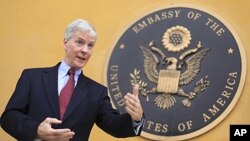U.S. Ambassador to Afghanistan Ryan Crocker said Thursday that there is "no question" the Pakistan-based Haqqani network was behind this week's coordinated attacks in Kabul and other eastern cities, targeting Western embassies.
Speaking to reporters in Kabul, Ambassador Crocker called the Haqqani insurgents “the worst of the worst” and “a group of killers, pure and simple.”
The U.S. ambassador said that in a meeting this week, Secretary of State Hillary Clinton pressed Pakistan's Foreign Minister Hina Rabbani Khar to end insurgent sanctuaries in the border areas.
“She said that action has to be taken against these groups and against the safe havens that they currently enjoy because they are a threat to Afghanistan, they are a threat to the United States and the international community, and they are a threat to Pakistan itself,” the ambassador said.
Tension
Anti-American sentiment in Pakistan has been on the rise in the last year following a number of incidents that many Pakistanis see as violations of their sovereignty. Those include the U.S. special forces raid in Abbottabad that killed Osama bin Laden and a NATO cross-border airstrike in November that inadvertently killed 24 Pakistani soldiers.
Following the airstrike, Pakistan virtually severed diplomatic relations with the United States and closed a vital NATO supply route to Afghanistan. Recently the Pakistani parliament unanimously passed a set of recommendations for resetting relations that includes a demand to end U.S. drone strikes in the border areas.
Washington is eager to rebuild its relationship with Pakistan in part because it will need the NATO supply route to for the planned 2014 drawdown of most combat troops in Afghanistan. But U.S. officials have not been willing to end drone strikes, which they say are key to success against al-Qaida and the Taliban. The drone attacks are believed to be carried out with the help of Pakistani intelligence.
Motive
Many Pakistani observers, like former ambassador to Afghanistan Rustam Shah Mohmand, believe U.S. claims that the Haqqani network is behind attacks in Afghanistan are politically motivated to justify drone strikes. Mohmand says the U.S. is lying either when it says the Haqqani network has sanctuaries in Pakistan or when it claims that the drone program has been effective.
“From the American point of view, the sanctuaries of the Haqqani network exist here in Pakistan," he said. "If that is true and that is verified, so what have the drones been doing? I mean they have been dropping, they have been striking those targets for the last five, six years.”
Complications
Disagreements over the drone program in light of the recent attacks in Afghanistan could further complicate talks between the U.S. and Pakistan to work together to bring stability to the border regions.
Ambassador Crocker also voiced U.S. support for Afghan government-led peace talks with Taliban insurgent groups. He said he hopes the Taliban chooses to reconcile with the Afghan government, which would mean breaking all ties with al Qaida, a total end to violence and accepting the Afghan constitution, including its protections for women and minorities.
Related video report by Meredith Buel:














